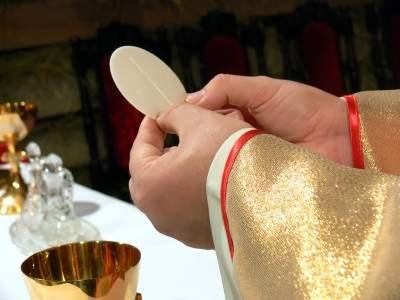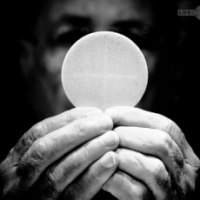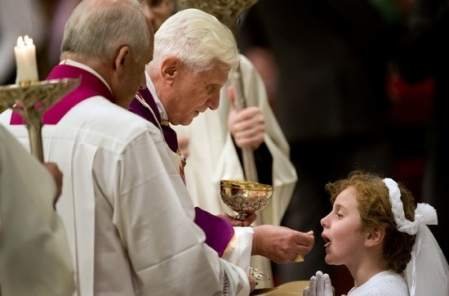 Today I’m troubled by the first major challenge from my parents to the Catholic Church: not so much, thankfully, to my personal journey, but ostensibly to the Catholic practice of closed communion.
Today I’m troubled by the first major challenge from my parents to the Catholic Church: not so much, thankfully, to my personal journey, but ostensibly to the Catholic practice of closed communion.
My father feels offended to be excluded from the Catholic Eucharist. As a baptized Christian, he feels he is privileged to partake. He feels that in denying him communion, the Church is in effect saying he is not a Christian. He feels that the practice of closed communion perpetuates division in the Body of Christ. My mother is hurt that she could not come to my church and take communion with me, or I with her at her church.
Frankly, I had no expectation that this would be an issue. It had not even occurred to me that this would be upsetting to anyone until I googled and found that many Protestants were troubled by this matter. From the very first time I attended Mass some seven years ago, then a thoroughgoing Protestant, it seemed perfectly natural and reasonable to me for the Catholic Church to exclude non-Catholics from the Eucharist. I recognized, even then, that the Church held the Eucharist to be most sacred, was very protective of it, and didn’t offer it to just anybody.
Further study revealed that closed communion is nothing new; it’s one of the most ancient customs of the Church:
But let no one eat or drink of your Eucharist, but they who have been baptized into the name of the Lord; for concerning this also the Lord has said, “Give not that which is holy to the dogs” (Didache 9, ca. mid to late first century A.D.).
We call this food Eucharist, and no one else is permitted to partake of it, except one who believes our teaching to be true and who has been washed in the washing which is for the remission of sins and for regeneration and is thereby living as Christ has rejoined (St. Justin Martyr, First Apology 65, ca. A.D. 150.).
So the Eucharist was closed to non-Christians; it was only open to baptized Christians who believed the truth of catholic teaching. Certainly, in those early days, when Christianity was outlawed and persecuted, an unknown stranger could not have simply shown up at a Christian meeting, professed to be a baptized Christian, and been received into the Mysteries; no, he would have to have been a known, accepted, and approved member of that community, or else commended to it by other known, accepted, and approved Christians. The Eucharist was closed for the Church’s protection. The unbaptized were not even allowed to be present at the Eucharist, let alone to receive it.
What says, then, that communion should be open? My dad points out that there is nothing in Scripture that says explicitly that communion should be closed; but likewise there is nothing in Scripture that says that it should be open to all without restriction. St. Paul, in 1 Corinthians, is writing to the church at Corinth, a closed communion of Christian believers. He does not recommend that the church open its doors and its table to strangers from the street; he is advising the church in the context of its own private, closed Eucharistic celebration. The Eucharist, the Communion of believers with Christ and with each other, is the most intimate and precious of all the Christian Mysteries. It was closely protected and guarded.
But this is 2012. There is no longer the need for such protection, is there? The liturgy of the Mass is no longer a closely-guarded secret; there are no longer accusations of cannibalism in Christians consuming the Lord’s Body and Blood; there are no longer persecutions unto death in our country. My parents are both baptized Christians. Shouldn’t they, known, accepted, and approved Christians, be allowed to receive the Eucharist, too?
That depends on what you believe the Eucharist to be. Evangelical Protestant communities that practice open communion by and large believe that the Lord’s Supper is merely symbolic, a memorial gesture of communion with the Lord, with no sacramental value. When I questioned my dad, this is basically what he affirmed. Christ extends the offer of grace and salvation to all; so why wouldn’t communion in His Body and Blood be extended to all? This exclusivity, this seeming denial of grace to the uninitiated, is what offends my dad.
 But if you believe, as the Catholic Church believes, that the Eucharist is a real, actual, physical communion, in body and spirit, with the Body and Blood of Jesus Christ, a sacramental commingling of our elements with His Elements, then it seems to me that you would have no choice but to be protective of that communion, and selective of who partakes in it. The Early Church allowed only those who believed and affirmed the reality of that Holy Communion. Why would the modern Church allow anyone who denies that reality? Should the Church offer the most intimate communion with our Lord to just anyone who walks in off the street, who doesn’t even have faith in Him? You may be a Christian — and the Catholic Church affirms that, if you have been baptized in the name of the Father, Son, and Holy Spirit, you have a right to be called Christian (Unitatis Redintegratio I.3 § 1) — but if you deny His Real Presence in the Eucharist, it is you who are denying yourself full communion.
But if you believe, as the Catholic Church believes, that the Eucharist is a real, actual, physical communion, in body and spirit, with the Body and Blood of Jesus Christ, a sacramental commingling of our elements with His Elements, then it seems to me that you would have no choice but to be protective of that communion, and selective of who partakes in it. The Early Church allowed only those who believed and affirmed the reality of that Holy Communion. Why would the modern Church allow anyone who denies that reality? Should the Church offer the most intimate communion with our Lord to just anyone who walks in off the street, who doesn’t even have faith in Him? You may be a Christian — and the Catholic Church affirms that, if you have been baptized in the name of the Father, Son, and Holy Spirit, you have a right to be called Christian (Unitatis Redintegratio I.3 § 1) — but if you deny His Real Presence in the Eucharist, it is you who are denying yourself full communion.
If you don’t share the Catholic belief in the Real Presence, why would you be offended at the closed communion? I think that is why it has never offended me: I recognized and respected that I believed differently. I think what offends my dad is the thought that since Christ’s death on the Cross was freely offered to all, why should participation in His Communion be offered to only a select few? This perception of exclusivity is in fact false. The Church has never excluded anyone from grace who sought it. She welcomes all Christians into full, Eucharistic Communion. But they must first affirm what she teaches: the reality of Christ’s presence in that Communion. What “perpetuates division” is Protestants’ continued denial of this core Catholic truth, the “source and summit of our faith.”
I think what offends my dad, even more fundamentally, is the idea that the Church has authority at all: the authority to tell anyone that they cannot celebrate the Eucharist when, where, and exactly how they wish. In the democratic and individualistic mindset that has ascended in modern evangelicalism, any individual is free to approach Christ outside and without the Church at all. It’s a misguided interpretation of the “priesthood of all believers,” taken to its furthest extreme: each believer individually is his own priest, and therefore needs no one else at all. And this gets into a whole ‘nother barrel of worms that I’ll have to deal with another time.
Suffice it to say that I am troubled. This will not stop the course I know I have been placed on; but I don’t want my parents to be offended or hurt. I don’t want them to feel excluded or rejected. But I’ve talked to my dad at length, and I don’t think there’s any getting past this; he’s unwilling to see the matter any other way.

